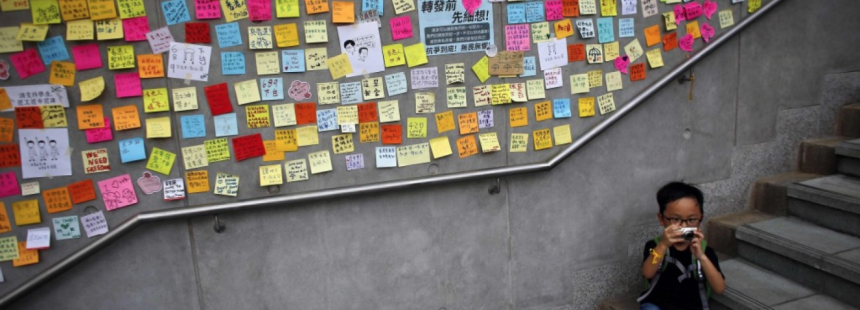

Still, they’ve gotten further than their counterparts in Moscow. Here’s why.
Why are the pro-democracy protesters in Hong Kong enduring where their counterparts in my country failed? A simplistic answer is that even the student Hong Kongers who barely recall the 1997 handover from the United Kingdom to China are accustomed to their special status and rights relative to the rest of China. The flame of Russian democracy, by contrast, flickered only briefly before President Vladimir Putin squelched it, and the memories of the chaos and corruption of the 1990s are not fond ones for most Russians. Thanks to a decade of anti-democracy propaganda and the annihilation of civil society, Russians worry, not unreasonably, that toppling Putin could lead to something even worse.
But there is something deeper at work. In truth, the Communist dictatorship in China needs its people—especially its young, educated, and global-minded ones—in a way Putin doesn’t. Hong Kong is still a large and strategically critical piece of a Chinese economy that depends on consumers in the free world, consumers who have far more information about the protests than nearly anyone in heavily censored China. A Tiananmen massacre in Hong Kong, transmitted around the world on millions of Chinese-made iPhones, could turn “Made in China” into a bloody mark.
Putin, on the other hand, has no use for the people of Russia, especially its young and educated. He and his junta are turning the country into a petro-state, and exporting natural resources to an insatiable global market doesn’t require entrepreneurs or programmers, let alone writers and professors. It’s also harder for disgusted consumer-countries to boycott oil and gas. That would require coordinated political will, a substance Putin knows is far rarer in the free world than the platinum and diamonds in the Ural Mountains.
Decades of economic and political engagement with the West and improved standards of living were supposed to liberalize dictatorships and provide leverage against them. But leverage is only useful if applied, and it is not clear Western countries are willing to do this. Seven months after Putin annexed Crimea and two and a half months after Russian-allied forces shot down a commercial airliner over Ukraine, Europe is still “considering” looking at ways to substitute Russian gas. The European Union gets a third of its oil and gas from Russia while buying over 80 percent of Russia’s petro-exports. Instead of using this overwhelming economic influence to deter Putin’s aggression, the Europeans feign helplessness.
The citizens of China and Russia have similar social compacts with their authoritarian governments: economic stability in exchange for their human rights. They both have heavily censored state propaganda instead of news and minimal freedom of speech and assembly. The key difference is that the Chinese regime is built on a broad collective and ideological base that is unlikely to experience drastic shifts. Putin’s Russia, on the other hand, is the most dangerous and unpredictable form of government: the dictatorship of just one man. The skyrocketing price of oil through the 2000s allowed Putin to fulfill, if marginally, his promises of pensions and payrolls. China started from a much lower point and managed to raise a billion people out of poverty by turning an entire nation into the world’s factory. Globalization and integration with rich free economies made both the Russian and Chinese scenarios possible.
The reason the developed world won’t fight back is that most consumers there would rather not know where their phones and gas come from as long as the prices are low. The occasional scandal over inhuman working conditions in Chinese factories is quickly and conveniently forgotten when the next shoe or gadget comes out.
Disputes between Washington and Moscow or Beijing are quickly criticized (often by the policymakers themselves) as a “return to the Cold War.” This use of this cliché today is ironic, since it requires forgetting, rather than emulating, how the Cold War was fought and won. Instead of standing on principles of good and evil, of right and wrong, and on the universal values of human rights and human life, we have “engagement,” “resets,” and moral equivalence. The Cold War was won not just by military or economic superiority, but on values that I, a former Soviet citizen, un-ironically call traditional American values. Chief among them is the belief that individual freedom matters and is worth sacrificing for, fighting for, even dying for. For now, the Hong Kong protesters appear admirably willing to test that proposition.
We cannot resolve the problems of globalization with the tools that created it. We need new frameworks to confront the globalized dictatorships in Russia and China. These frameworks must be based on moral principles, the only weapon the enemies of democracy cannot match. This is even more obvious when those enemies possess nuclear weapons, making a military confrontation unimaginable.
The protests in Hong Kong also rebut what I mock as “the genetic concept of democracy.” For years I have been told that Russians (or Arabs, or Chinese) simply aren’t disposed to democracy. They require a “strong hand” or they “love a tough leader.” This is just one of many theories people born in the free world use to mask their privilege, their inaction, and their shame. It’s condescending and ridiculous when you look at the two Germanys, the two Koreas, or Taiwan.
What is true is that no one is simply entitled to democracy, or even to basic human rights. No, these things must always be fought for, and if the brave students in Hong Kong can remind the world of this then their protest is already a success.c
via Washington Post

